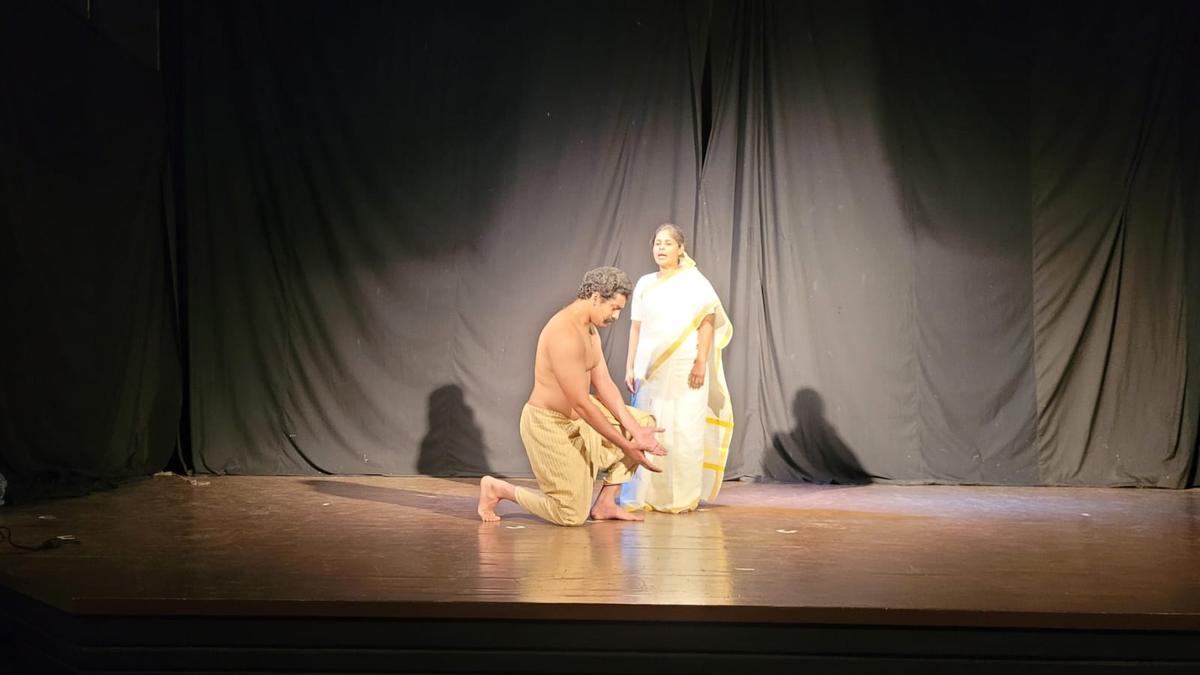
Karna, Kunti, and the ebb and flow of intense emotions
The Hindu
Experience Tagore's poignant Karna Kunti Samvad and 'Omchery' N.N Pillai's satire on gender bias in Thespian en's plays.
“Let your forgiveness burn her heart like fire and consume its sin” — Kunti’s entreaty to Karna seeking absolution for the terrible sin of abandoning him at birth to escape the stigma of pre-wedlock conception, is a searingly poignant moment in Rabindranath Tagore’s poem Karna Kunti Samvad.
Chennai-based theatre group Thespian en staged Karna and Kunti based on Tagore’s work, at the Alliance Française recently, affording a deeper look at the mind’s eye of the Nobel Laureate for the dramatic potential of this encounter between a mother of five and her forsaken first child, and his brilliant exposition of the iconic episode from the Mahabharata.
Directed by Ajit Chitturi, the play is set against the backdrop of an imminent Armageddon. It is on the very eve of the Kurukshetra war that Kunti (Shanthi Palaniappan) summons all her resolve to break the news to Karna (Rudhvir Vadhan) that she is his biological mother, her first son and the eldest among the Pandava brothers. The exchange that ensues between the mother and son is marked by the ebb and flow of intense emotions. Kunti is wracked by guilt, shame and dread at the prospect of one son slaying another in the battlefield, while Karna is overwhelmed by anger, sorrow and indignation at the insults he had been subjected to as an “illegitimate child”.
It is a Tagore masterclass put in motion as the two characters get swept up in a deep swirl of inner turmoil. For Kunti, the timing to make her revelation of Karna’s true identity is beyond unburdening the guilt. It also represents a desperate roll of the dice to avert the war between siblings.
A defining moment in the dialogue comes when Karna, wracked by a mixture of relief, regret, joy, and pain, refuses to abandon the side of Duryodhana, who had him crowned the king of Anga. Even in his most conflicted state, Karna’s sense of dharma shines through as he consoles Kunti by foretelling the victory of the Pandavas in the war. And, Kunti cannot but admire Karna’s heroic stand and unshakeable loyalty when he knowingly commits to the losing side.
It is a drama-filled encounter that the actors portray effectively with a dignified restraint rather than overblown rhetoric. “The rule of the thumb all along the theatrical run since we produced this play in 2013 as a tribute to the veteran artiste the late Bhagirathi Narayanan is to never let in elements of melodrama,” said Mr. Chitturi.
“I believe that the best way to internalise the character for an actor is by minimising hand movements or facial gestures and leaving the emoting entirely to vocal delivery,” he added.













